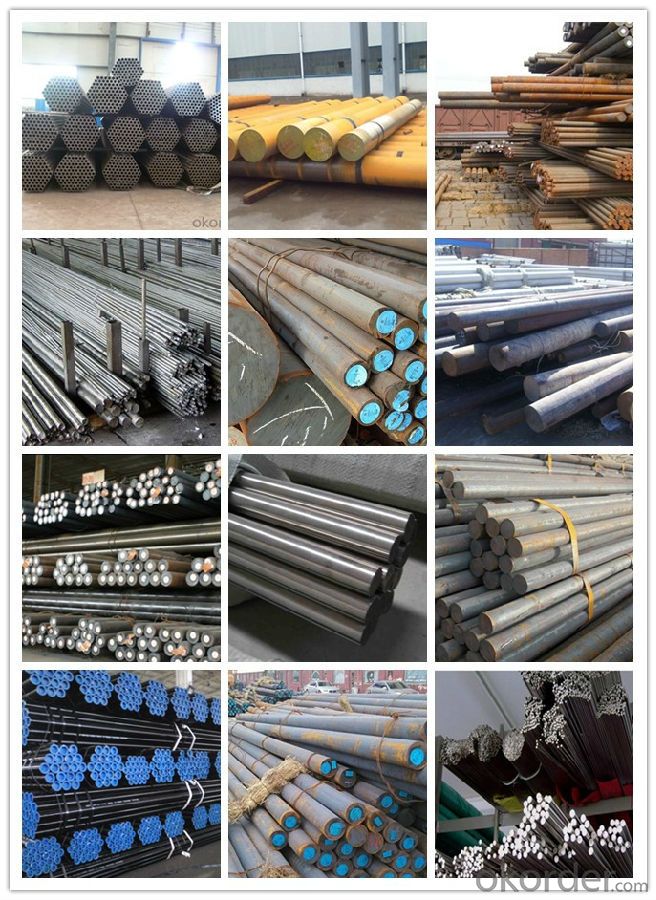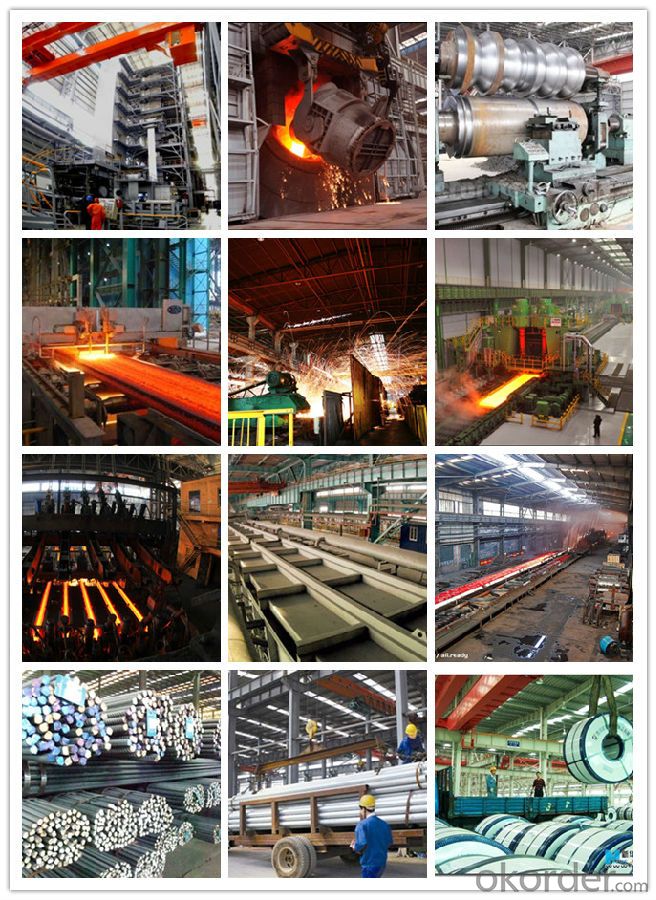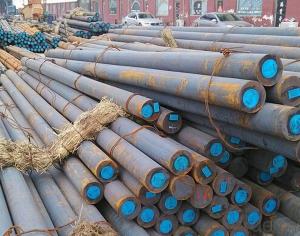Round Bar ASTM1020, 1045,1035 Forged Steel Special Steel
- Loading Port:
- China main port
- Payment Terms:
- TT OR LC
- Min Order Qty:
- 30 m.t.
- Supply Capability:
- 10000 m.t./month
OKorder Service Pledge
OKorder Financial Service
You Might Also Like
Item specifice
ASTM1020, 1045,1035 forged steel round bar
Standard | GB/T699,GB/T700,GB/T702 |
Grade | 20#,35#,45#,Q235B- Carbon Steel bar |
Dimensions | Dia 10mm-1000mm |
Place of Origin | China (Mainland) |
Secondary Or Not | Non-secondary |
Application | Structure bar |
Technique | Forged |
Certification | API |
Alloy Or Not | Is Not Alloy |
packing | Hexagon bundle or bare bundle |
Delivery | By container/train/lorry |
Delivery time | 10days |
Third Party Inspection | SGS/BV/LORDS |
Product show

Workshop show

Shipping
1. FedEx/DHL/UPS/TNT for samples, Door-to-Door;
2. By Air or by Sea for batch goods, for FCL; Airport/ Port receiving;
3. Customers specifying freight forwarders or negotiable shipping methods!
Delivery Time: 3-7 days for samples; 5-25 days for batch goods.
Payment Terms
1.Payment: T/T, L/C, Western Union, MoneyGram,PayPal; 30% deposits; 70% balance before delivery.
2.MOQ: 1pcs
3.Warranty : 3 years
4.Package Informations: 1) EXPORT, In 20 feet (GW 25 ton) or 40 feet Container (GW 25 ton)
2)as customer's requirement
Why choose us?
(1) The leading exporter in China special steel industry.
(2) Large stocks for various sizes, fast delivery date.
(3) Good business relationship with China famous factories.
(4) More than 7 years steel exporting experience.
(5) Good after-sales service guarantee.
- Q:How does special steel perform in high-vibration environments?
- Special steel performs well in high-vibration environments due to its exceptional strength, durability, and ability to dampen vibrations. Its unique composition and heat treatment make it highly resistant to fatigue, reducing the risk of fractures or failures caused by constant vibrations. Additionally, special steel's excellent hardness and toughness properties allow it to maintain its structural integrity and performance even under severe vibration conditions.
- Q:How is tool steel used in the manufacturing of molds and dies?
- Tool steel is used in the manufacturing of molds and dies due to its high hardness, toughness, and wear resistance properties. It is used to create molds and dies that are capable of withstanding the high pressures and temperatures involved in various manufacturing processes, such as injection molding and metal stamping. Tool steel ensures that the molds and dies maintain their shape and functionality over prolonged use, resulting in efficient and accurate production of various products.
- Q:What are the corrosion resistance properties of special steel?
- Special steel, also known as stainless steel, exhibits excellent corrosion resistance properties. This is primarily due to the presence of chromium, which forms a protective layer on the surface of the steel, preventing oxidation and corrosion. Additionally, special steel alloys may contain other elements such as nickel, molybdenum, and titanium, further enhancing their corrosion resistance. These properties make special steel highly suitable for various applications in industries such as construction, automotive, and aerospace, where resistance to corrosion is essential for long-term durability and performance.
- Q:What are the different stamping grades of special steel?
- Various industries utilize different grades of special steel for stamping purposes. Some commonly used stamping grades are as follows: 1. Low Carbon Steel: This special steel grade is renowned for its exceptional formability and weldability. It finds extensive use in applications necessitating deep drawing or intricate bending. Moreover, low carbon steel is both cost-effective and readily available, making it a highly preferred choice for stamping processes. 2. High Strength Low Alloy (HSLA) Steel: HSLA steel, a type of special steel, incorporates small amounts of alloying elements like copper, nickel, or chromium. This grade offers superior strength and enhanced toughness compared to low carbon steel. It is commonly employed in automotive components, structural parts, and other applications demanding strength and durability. 3. Stainless Steel: Stainless steel is a corrosion-resistant special steel comprising a minimum of 10.5% chromium. It is frequently employed in stamping applications that require resistance against rust, staining, and corrosion. Stainless steel is available in various grades, such as 304, 316, and 430, each offering distinct levels of corrosion resistance and mechanical properties. 4. Tool Steel: Tool steel, a high-quality special steel, is specifically designed for applications necessitating resistance to wear, deformation, and high temperatures. It is commonly used in stamping dies, cutting tools, and other applications where hardness and toughness are vital. Notable tool steel grades include D2, A2, O1, and M2, among others. 5. Electrical Steel: Electrical steel, also known as silicon steel, is a special grade characterized by high magnetic permeability and low electrical conductivity. It finds application in stamping operations requiring efficient magnetic properties, such as transformers, motors, and generators. The aforementioned examples represent only a fraction of the stamping grades available in special steel. The selection of each grade depends on the specific requirements of the application, such as strength, corrosion resistance, magnetic properties, or formability.
- Q:What are the different methods for controlling the grain size in special steel?
- There are several methods for controlling the grain size in special steel. One common method is through the use of alloying elements such as vanadium or niobium, which can help refine the grain structure. Another approach is to employ controlled cooling techniques, such as quenching or tempering, to manipulate the rate at which the steel solidifies and thus control the grain size. Additionally, grain size can be influenced by the addition of grain refiners or by subjecting the steel to severe plastic deformation processes like rolling or forging. Overall, these methods allow for precise control over the grain size in special steel, enabling improved mechanical properties and performance.
- Q:What are the different carburizing techniques used for special steel?
- There are several carburizing techniques used for special steel, including gas carburizing, pack carburizing, liquid carburizing, and vacuum carburizing. Each technique involves introducing carbon into the surface of the steel to enhance its hardness and wear resistance. Gas carburizing involves heating the steel in a controlled atmosphere of carbon-rich gas, while pack carburizing entails surrounding the steel with a mixture of carbon-rich material and heating it. Liquid carburizing involves immersing the steel in a bath of molten salts or other carbon-rich liquid, and vacuum carburizing utilizes a low-pressure environment to introduce carbon into the steel's surface. These techniques are chosen based on the specific requirements of the steel and the desired end properties.
- Q:How does special steel perform in high-temperature creep?
- Special steel is specifically designed to perform well in high-temperature creep conditions. Creep refers to the tendency of a material to deform under constant stress over time at elevated temperatures. Special steel exhibits excellent resistance to creep due to its unique composition and heat treatment processes. The alloying elements used in special steel, such as chromium, nickel, and molybdenum, significantly enhance its high-temperature strength and creep resistance. These alloying elements form stable carbides and improve the material's ability to retain its structural integrity even at elevated temperatures. Furthermore, special steel is often subjected to specific heat treatment methods, such as annealing or quenching and tempering, to further enhance its creep resistance. These processes help in refining the microstructure of the steel, reducing the presence of internal stresses, and improving its overall mechanical properties. The combination of alloying elements and heat treatment processes in special steel provides it with exceptional creep resistance. It can withstand prolonged exposure to high temperatures without significant deformation or failure. This makes special steel an ideal choice for applications that involve high-temperature and high-stress conditions, such as gas turbines, petrochemical plants, and power generation facilities. Overall, the performance of special steel in high-temperature creep is outstanding, and it is widely recognized as a reliable and durable material for applications requiring resistance to thermal deformation and long-term stability under constant stress.
- Q:How is stainless steel used in the food and beverage industry?
- Stainless steel is widely used in the food and beverage industry due to its unique properties. It is corrosion-resistant, easy to clean, and does not impart any taste or odor to the food or beverage being prepared or stored. Stainless steel is used in various applications such as food processing equipment, storage tanks, utensils, and even in the construction of kitchen appliances. Its hygienic nature and durability make it an ideal choice for maintaining food safety standards and ensuring the quality of products in the industry.
- Q:How does special steel contribute to reducing product waste during manufacturing?
- Special steel contributes to reducing product waste during manufacturing by offering superior strength, durability, and corrosion resistance. Its unique properties allow manufacturers to produce components that are longer-lasting and more resistant to wear and tear. This reduces the need for frequent replacements or repairs, ultimately minimizing product waste and increasing overall efficiency in the manufacturing process.
- Q:Can special steel be used for making automotive engine components?
- Yes, special steel can be used for making automotive engine components. This type of steel offers enhanced strength, durability, and heat resistance, making it suitable for critical engine parts such as crankshafts, connecting rods, valves, and camshafts. Special steel helps improve engine performance, efficiency, and longevity, making it a preferred choice in the automotive industry.
1. Manufacturer Overview |
|
|---|---|
| Location | |
| Year Established | |
| Annual Output Value | |
| Main Markets | |
| Company Certifications | |
2. Manufacturer Certificates |
|
|---|---|
| a) Certification Name | |
| Range | |
| Reference | |
| Validity Period | |
3. Manufacturer Capability |
|
|---|---|
| a)Trade Capacity | |
| Nearest Port | |
| Export Percentage | |
| No.of Employees in Trade Department | |
| Language Spoken: | |
| b)Factory Information | |
| Factory Size: | |
| No. of Production Lines | |
| Contract Manufacturing | |
| Product Price Range | |
Send your message to us
Round Bar ASTM1020, 1045,1035 Forged Steel Special Steel
- Loading Port:
- China main port
- Payment Terms:
- TT OR LC
- Min Order Qty:
- 30 m.t.
- Supply Capability:
- 10000 m.t./month
OKorder Service Pledge
OKorder Financial Service
Similar products
New products
Hot products
Related keywords





























